With all its musical, dramatic, and often technical demands, opera is one of the toughest art forms to get right. With so much at stake – and don’t forget the box office! – no wonder programmers feel the pressure to play bankable and safe. It’s therefore doubly satisfying when something unfamiliar comes along that ticks few of the ‘guaranteed’ boxes yet emerges as a satisfying artistic whole. That is certainly the case with this intelligent, eye-popping Opera Australia staging of a lesser masterpiece of the 1920s, served up to Sydneysiders in a musically sumptuous co-production with London’s Royal Opera House and supported by the Sydney Festival.
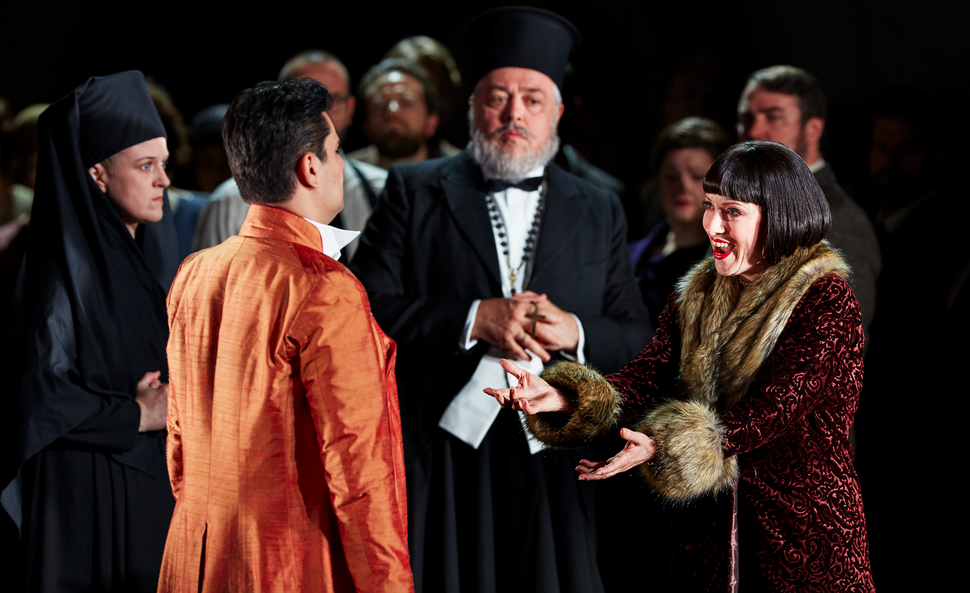 Dominica Matthews as Deaconess, Saimir Pirgu as Shepherd, Gennadi Dubinsky as Archiereios, Lorina Gore as Roxana and the Opera Australia Chorus. Photos by Keith Saunders
Dominica Matthews as Deaconess, Saimir Pirgu as Shepherd, Gennadi Dubinsky as Archiereios, Lorina Gore as Roxana and the Opera Australia Chorus. Photos by Keith Saunders
In some ways, Karol Szymanowski’s operatic masterpiece King Roger (or Król Roger in its native Polish) is a typical product of its time. Lush and exotic, with pungent musical modes and a sense of the otherness of distant cultures, it shares a fascination for ‘the East’ with the works of Franz Schreker, or even Puccini’s Turandot. If that’s where the resemblance ends, that’s as much to do with the geographical isolation and the unique emotional consciousness of a highly original composer who had no intention of banishing the personal from his music or toeing any of the exact lines then prevalent in European music.
Szymanowski chose to tell a fictional tale of a great Sicilian medieval monarch for many reasons. The composer himself had been spiritually awakened by a visit to the island. Its warmth and blend of ancient cultures had touched a chord, not least one connected to his own sexuality and psyche. A gay man, unusually comfortable in his skin for his period, he was drawn to the ecstatic and embraced the permissive. His chosen story combined elements familiar from The Bacchae, Euripides’ great drama on the temptations and dangers of physical abandon, with a dose of Freudian psychology and a semi-autobiographical element. It’s not unfair to say that in some respects at least, Roger is Szymanowski.
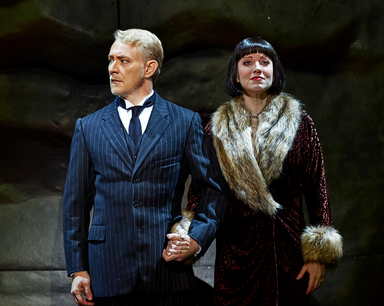 Michael Honeyman as King Roger and Lorina Gore as Roxana
Michael Honeyman as King Roger and Lorina Gore as Roxana
Kasper Holten understands all of that, choosing to relocate the setting to a straight-laced country of Szymanowski’s own time where conservative forces of orthodox religion and conventional government are confronted by the unfamiliar hedonistic ideologies of an unnamed prophet calling himself simply “The Shepherd”. Opposing the new God are the Archbishop and Deaconess, representing a stern, unflinching traditionalism and, more cautiously, Roger’s advisor Edrisi, reflecting the tug of the rational and the bookishly poetic. The Circe of the piece is Queen Roxana, a woman who it seems has been starved of physical and spiritual love for some time, yet whose fundamentally sensual nature is naturally aligned with the beguiling newcomer.
The conflict is played out literally inside and outside of Roger’s head, represented on stage by Steffen Aarfing’s breathtakingly monumental iron-meets-stone sculpture, over which Jon Clark’s sensitive and imaginative lighting and Luke Halls’ video design play as if at will. Outside the head we are in a Greek arena, in the Romanesque loggias of which stand Roger’s people, ready to cheer or condemn. Inside the rotating skull we are in the King’s domain, his books and globe high up in the seat of learning, while down below writhe a dozen faceless, scarred, muscular-torsoed men who thrust, stir and reach for him whenever he looks set to descend into his sexual basement – a sinister, living libido, if you will.
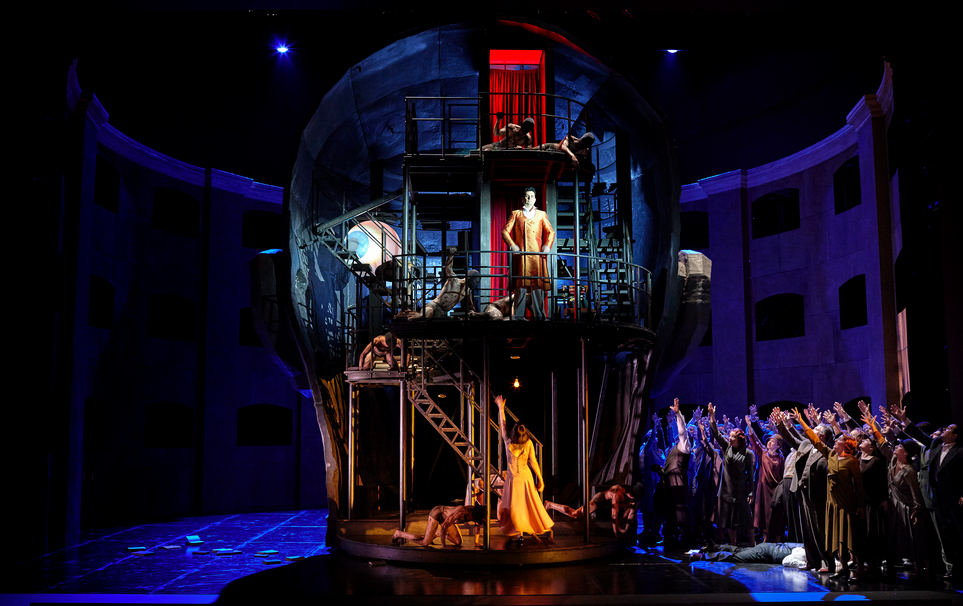 Saimir Pirgu as Shepherd, Lorina Gore as Roxana, the Opera Australia Chorus and dancers
Saimir Pirgu as Shepherd, Lorina Gore as Roxana, the Opera Australia Chorus and dancers
It’s a brilliant confection, staged with a great eye for the tableau – Szymanowski’s opera is dangerously static – yet never forgetting to focus attention on the conflicted principal cast. And what a great cast it is, headed by Michael Honeyman as the tortured monarch in what is far and away his most impressive performance for the Company to date. Roger is a damned difficult part, dramatically vacillating; constantly under pressure, yet demanding a vocal firmness and determination completely at odds with all of that. Honeyman captures the tormented leader, uncomfortable from the get-go in his stuffily starched collar, wishing to be authoritative and live in the bright light of day, yet emotionally closeted and dangerously tempted by the sensuality and music of the night. His distress at the book burning – surely the most sinister side of any regime, and a clear echo of the times ahead in Szymanowski’s Europe – is perfectly played. Vocally the role sits just right for him, his baritone ringing out loud and clear with plenty of bite. His desperate cries of “Roxana” in the final act are heart-rending, his Polish more than convincing.
As the Shepherd, Albanian tenor Saimir Pirgu is a suitably seductive presence, his suave looks and the cut of his Indian-inspired jib giving him an otherness in keeping with the ambiguity of the role, yet he’s dangerous too, inherently sniffing out Roger’s emotional weakness and vulnerability. It’s a tough sing, sitting awkwardly high, but Pirgu never falters, singing with bright, flexible tone and managing some seriously sensual floated phrases dripping with honeyed promises. His first act aria in which he declares that “My God is as beautiful as I am” is seductively spun, the voice riding smoothly over Szymanowski’s dangerously long phrases.
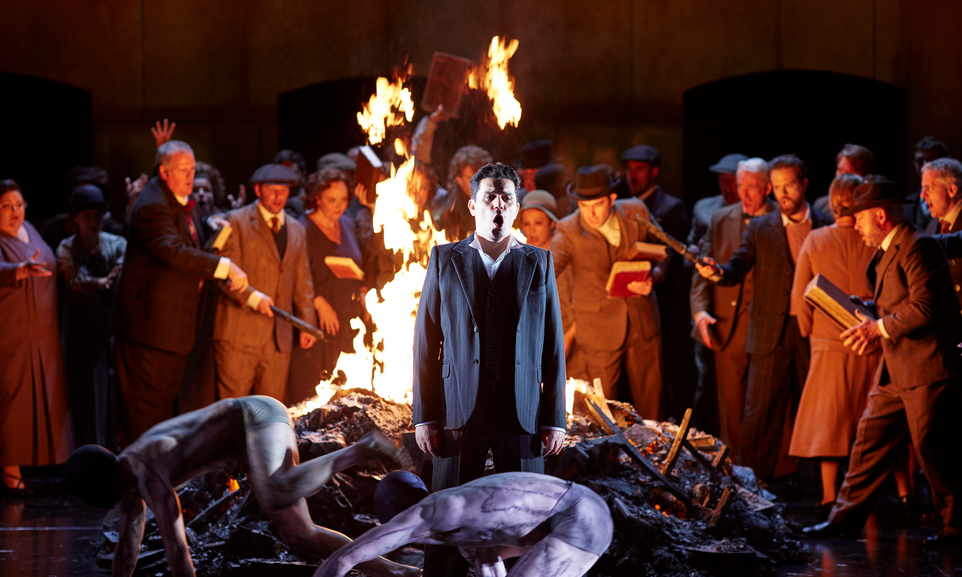 Saimir Pirgu as Shepherd, the Opera Australia Chorus and dancers
Saimir Pirgu as Shepherd, the Opera Australia Chorus and dancers
Lorina Gore and James Egglestone also excel as the twin magnets acting on Roger’s moral compass. As Roxana, Gore is both crystalline and sensual, her impressive coloratura coping effortlessly with the arabesques inherent in the Queen’s melismatic lines. Her famous act two aria – the only part of the score to get an independent outing – is radiantly done, the extended vocalises deftly despatched. Egglestone is mellifluous and firm of tone, capturing the pedagogical and discursive in the character, though the role is rather underwritten.
As his religio-political hammer and anvil, Gennadi Dubinsky is a potent, pompous Archbishop, Dominica Matthews a severe, gesticulating Deaconess with a touch of Madame Mao about her. Both sing with power and clarity, their utterances backed up by the magnificent contribution of the Opera Australia Chorus who pin the audience to the back of the theatre with the sheer power of their choral projection. They don’t exactly have much to do on stage, but they are an integral force to be reckoned with in Szymanowski’s orchestration and carry the day with fine diction, despite the linguistic hurdles.
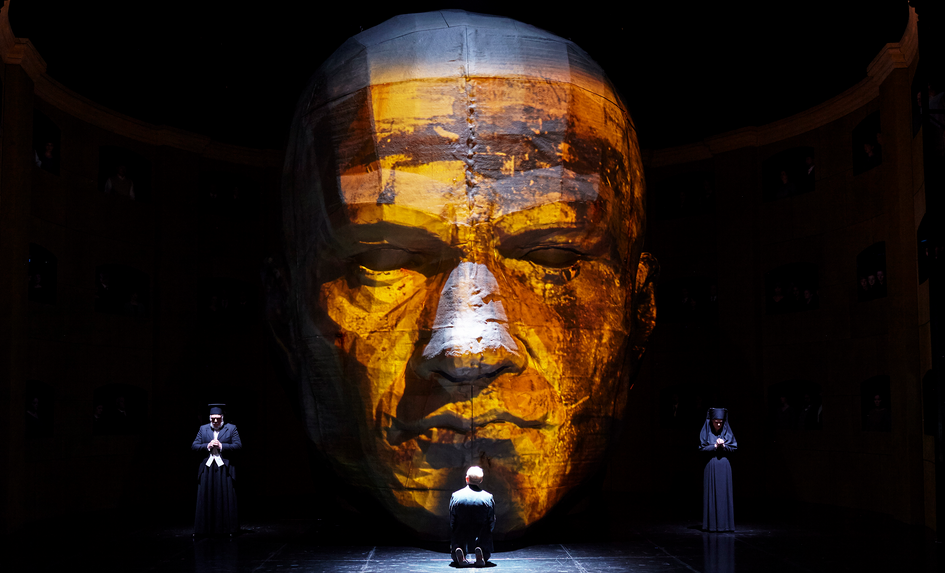 Gennadi Dubinsky as Archiereios, Michael Honeyman as King Roger and Dominica Matthews as Deaconess
Gennadi Dubinsky as Archiereios, Michael Honeyman as King Roger and Dominica Matthews as Deaconess
Many of the beauties of King Roger lie in the score, a heady cocktail of turn-of-the-century post-Wagnerian Romanticism with French impressionist attention to detail and deeply embedded fragments of orthodox chant and Moorish melodies. The opera even begins with dramatic gong strokes and a convincingly dark and baleful Eastern Orthodox ceremony. Andrea Molino conducts from memory – yes, from memory! – and builds a most seductive edifice that washes over us with wave upon wave of luxurious orchestral tone. The second act bacchanal is a glittering highlight, but so is the spare nocturnal that opens the final scene. Strings, woodwind and brass all have their moments to shine and the standards here are very high indeed.
There’s a lot of talk right now about risk and reward in the arts in times of uncertain funding, with clearly a lot of appetite around for the unexpected and unusual. With the kind of artistic standards and ambition on display here it would be great if King Roger were to sell and sell well. In other words, if you want to empower the national opera company to take a chance next time, buy a ticket (they are going from as little as $23). A heady dose of Szymanowski’s erotic mysticism can be thoroughly recommended.
Opera Australia’s King Roger is at the Sydney Opera House as part of the Sydney Festival until February 15












Comments
Log in to join the conversation.